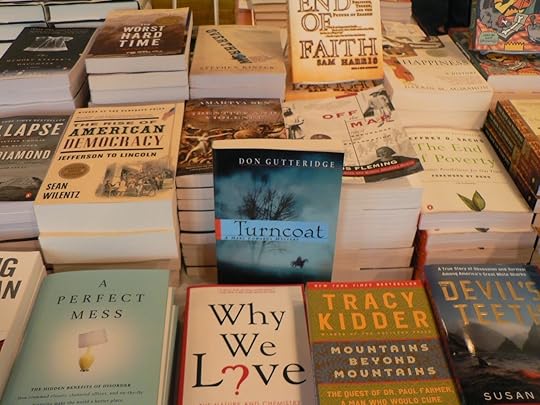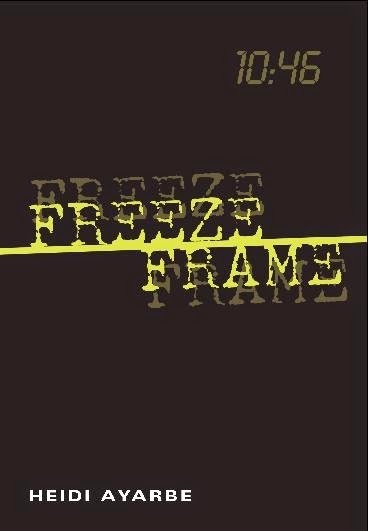I think when we're in the middle of something, we feel like everybody understands what we do because, well, we're the ones doing it, every day. Most of things these about being writer I never knew until I was in the midst of it all. Some were shocking. Some came naturally. And some have just been part of my work ethic from the beginning -- but things I didn't really know how to put a name to.
I want to present these things in a neutral way, without putting a negative or positive vibe to them.
Here are some peculiarities, hazards, and unexpected wonderful things about the business of writing.

Co-Op TableI have no job security. (Hence, DON'T QUIT THE DAY JOB ... unless you're John Grisham, JK Rowling, Ellen Hopkins or one of those very select few ... like 3% of authors quit their day jobs.)I don't pick my title. I get to have input, for sure, but I'm not the final on the title choice. Freeze Frame went through seven titles from
Finding Yesterday to
Shattered. I love the final choice. My other books have had a similar process. Why? Because there are lots of others who have lots of experience who are more in tuned to the market than I am. It's not like naming your kid, okay? This is business.I don't pick my covers. I don't design my covers. I don't have a voice in the process. I've been shown my covers ahead of time out of courtesy, of course, and my editors and publishers have always wanted me to be on board with them. I've been fortunate in that I've had some pretty amazing covers so far. (My personal favorites are Freeze Frame and Compulsion because I truly believe those covers are the ones that best encapsulated the books. My other covers are beautiful, but I don't think they say as much about the book as FF and Compulsion's covers do). But I also know that my approval is not needed.


Publishers and editors truly believe in their authors, their books, and go to bat, every day, for unknown authors, authors who have soft sales (industry lingo for "The book tanked."), and risky projects. They have a lot of faith in their writers. When your book doesn't go to "paperback" it's because of "soft sales." (Yes, play taps here ... until your next book or next project or until the next editor takes another leap of faith.) Two of my books haven't gone paperback. (Which is total suckage. Yes. But it is what it is). Speaking of leaps of faith, this whole business has that lovely element -- people who believe in others' work without knowing for certain whether it will bring in cash. And some publishers and editors choose books simply because they believe they're worth it, need to be out there, regardless of possible tanking (see above).It's not done until ... they say so. There are dizzying numbers of revisions with your editor, then copy editors, then back to the editor ... then the ping-pong match between everyone until ... ta-da! My editors/copy editors fact check everything (from movie quotes to routes I had characters take in the city to make sure it was feasible). And one wasn't aware of the
not-so-secret menu from In-N-Out Burgers until we assured her that it exists and I didn't pull the Neapolitan shake out of ... nowhere.I only get fifteen copies of my books. That's it. It's not like I have a never-ending supply of books to give away. And those copies are reserved for, more often than not, prizes, promotion, huge thanks to anyone who's helped in the process, my sister, nieces, daughters and mom. They're GOLDEN and so when someone asks me for a copy, and I end up sending one, it's because I really love that person or believe in his/her charity, and it's more likely than not, one of the books I bought with my money to have for extra causes.If you don't sell or win awards, you won't have a long, loving relationship with any publisher. It's until, "'till poor sales do us part." It's a business, after all, not a charitable organization investing tens of thousands of dollars to fail.Most books don't make back their advances ... It's a pyramid of a few select authors pulling the weight of the others. There's a huge "mid-list" group of authors that might go into second printing, win an award, get on State lists ... all of this advances the publishing house clout and gives them a boost. Here's a really good post on what each book
costs the publisher and how much they make or lose.I could spend a year on a book, another on revisions, after receiving and advance and getting it ready for publication, approved by everyone, and have it still get shelved. Timing. Bad timing, usually. Some books, after all the work in the world, don't get published.After getting the book out there, some stores may choose not to carry it. This is pretty devastating if it's a big chain (Barnes & Noble). There are 696 Barnes & Noble stores. If their buyers don't want my books in the stores, selling the book is really
really hard to do. The bookstores might get excited about the book, order a thousand, and return, every single one. All books are kind of on consignment.

I owe so much of what I've been able to write today to my agent, my editors, publishers, and the IRA (International Reading Association) who awarded Freeze Frame, in 2009, with the
best book for young adults. I am forever grateful because I've had the privilege to write the stories that I've wanted with support and professionals driving me to be better with every page, every word. This is something I don't take for granted. Ever.Publishers nominate books to get key real estate in bookstores (display cases and tables) and bookstores/chains choose which books they want to display -- sometimes more books are nominated (between all publishers) than there is space. It's all about which book they think (both publisher and book seller) will sell most and bring in more buyers. This is called
co-op. There's a lot of behind the scenes stuff, so I recommend you read the linked post by Nathan Bransford. Most touring authors travel between 20 and 25 weeks/year. Some authors go on tour with the release of a book. These guys are the big dudes in the business. Many make a living visiting schools and book fairs working hard to get booked and delivering stellar work. And most are like me. At home. Writing. Blog touring because doing actual tours would be virtually impossible because of financial reasons or time.The most important time for any book is pre-sales and the month after it's released. After that ... it sort of creeps onto the shelf of the forgotten. (Which I like to refer to the shelf of soon-to-be-discovered ...) *sigh* Word of mouth continues to be the most powerful motor for sales. If you love a book, SCREAM ABOUT IT.
It's a quirky business. That's the point. It's a business. Do you have any questions about the book making business? A lot of it is still a bit foggy to me. Honestly, I learn more every day.
 newest »
newest »
 newest »
newest »
 SO informative and helpful. Thanks you for posting this! :)
SO informative and helpful. Thanks you for posting this! :)
 Rachel wrote: "SO informative and helpful. Thanks you for posting this! :)"
Rachel wrote: "SO informative and helpful. Thanks you for posting this! :)" Yes, but I'm on submission, for the third time, and the quirky stuff is always the stuff you need to know soon but no one tells you before you get there. It's like it's Top -Secret Info. LOL
Yes, but I'm on submission, for the third time, and the quirky stuff is always the stuff you need to know soon but no one tells you before you get there. It's like it's Top -Secret Info. LOL
 Sorry I didn't respond earlier. Yes. It always feels like everything is so mysterious when it shouldn't be. GOOD LUCK ON THE SUBMISSION PROCESS!! That's so nail=biting. What do you write?
Sorry I didn't respond earlier. Yes. It always feels like everything is so mysterious when it shouldn't be. GOOD LUCK ON THE SUBMISSION PROCESS!! That's so nail=biting. What do you write?
 Rachel wrote: "Yes, but I'm on submission, for the third time, and the quirky stuff is always the stuff you need to know soon but no one tells you before you get there. It's like it's Top -Secret Info. LOL"
Rachel wrote: "Yes, but I'm on submission, for the third time, and the quirky stuff is always the stuff you need to know soon but no one tells you before you get there. It's like it's Top -Secret Info. LOL" Thanks Heidi,
Thanks Heidi,






